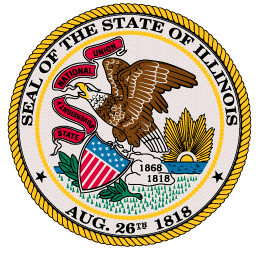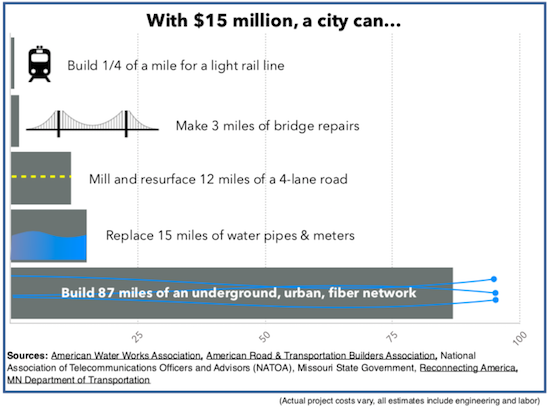In June, Governor JB Pritzker signed the Rebuild Illinois capital plan, a $45 billion effort that will repair and improve all manner of infrastructure in the state. Within the plan, state leaders intend to dedicate $420 million to upgrade and expand broadband infrastructure. Such a significant investment can make a real difference in the state, as long as decision makers adopt smart policies and allow local communities to receive funding for broadband projects.
Gas Tax for Gigabits
An increase in the state’s motor fuel tax will fund most of the broadband initiative. The increase in gas prices at the pump, which took effect on July 1, jumped from 19 to 38 cents. Similarly, a special fuels tax on diesel, liquefied natural gas, and propane increased from 2.5 cents to 5 cents. State analysts anticipate the increase will garner an additional $1.24 billion to state coffers in 2020.
The Rebuild Plan also grants state bonding authority for infrastructure projects and Cook County municipalities are permitted to raise their gas taxes by an additional three cents per gallon. There are also title and registration fees that will contribute to the fund.
As part of the plan, Illinois created the Connect Illinois initiative, which is part of the Illinois Department of Commerce. One of the goals of the initiative’s Broadband Office is to provide all K-12 students with high-speed Internet access at no charge. As part of the Rebuild Illinois plan, $20 million will be used to update and expand the Illinois Century Network, which serves K-12 schools, colleges and universities, public libraries, and Internet access providers.
 Connect Illinois and the initiative’s Broadband Office will administer the grants made possible by the fuel tax increase. The office will also work to determine federal grants that are available and how best to access them to advance the state’s goals.
Connect Illinois and the initiative’s Broadband Office will administer the grants made possible by the fuel tax increase. The office will also work to determine federal grants that are available and how best to access them to advance the state’s goals.
Connectivity Council
In mid-August, Pritzker announced that the state had appointed the 25 members of the Broadband Advisory Council in keeping with the Broadband Advisory Council Act. The group will study broadband in Illinois, examine probable solutions for expanded adoption, and make recommendations to the General Assembly by the end of 2019. The Act mandates the number of members on the council and what sectors each members represents.
At an August 15th press conference, the Governor said:
“Rebuild Illinois will improve our infrastructure at a historic scale, and it lays the foundation for economic progress and educational success for the decades to come. High-speed broadband internet is an absolute necessity for economic progress and educational attainment, but too many of our towns and counties and communities have been left out of the digital revolution, especially downstate. Our Broadband Advisory Council will be guided by three areas of focus for Illinois’ success in the 21st century: education, telehealth and economic development. By working together, we’re going to Connect Illinois.”
In addition to determining barriers, they are to seek out possible collaborations between organizations that need good connectivity and folks that typically end up on the wrong side of the digital divide. The council contains representatives from multiple state agencies and associations concerned with the interests of sectors such as agriculture, the elderly, education and higher ed, lower income families, healthcare, and libraries. Several Senators and House members will also serve on the council.
 Internet access companies also maintain several seats on the council, but the balance is slanted in favor of the less-desirable companies with poor track records of rural deployment. AT&T, Verizon, Comcast, and Frontier have members on the council. Many of Illinois’s many smaller ISPs could have fulfilled several of the required council seats, but the only firm on the council that is not a national company is Metro Communications. Missed opportunity.
Internet access companies also maintain several seats on the council, but the balance is slanted in favor of the less-desirable companies with poor track records of rural deployment. AT&T, Verizon, Comcast, and Frontier have members on the council. Many of Illinois’s many smaller ISPs could have fulfilled several of the required council seats, but the only firm on the council that is not a national company is Metro Communications. Missed opportunity.
Subscribers have leveled many complaints and accusations of negligent behavior toward Frontier in the past year, and other members of the council should remember that the company has often disregarded the needs of their subscribers. In Minnesota, the Attorney General has opened an investigation as to whether or not the company violated consumer protection laws. Considering the many Internet access companies offering service in Illinois, the state could have found, and should seek out, a better ISP to fill the seat.
With one electric cooperative on the council, there’s little representation from the publicly owned broadband sector. As they consider how grants should be distributed, the council will need to reach out to local Illinois communities and learn how publicly owned options benefit economies and improve the quality of life. They can start with Angela Imming from Highland Communication Services.
Looking at Other Places, Considering the Future
By the end of 2019, the council will provide recommendations to the General Assembly and the Governor. The council will offer advice on ways to reach unserved and underserved populations, methods that will facilitate adoption by all citizens, and statutory changes that will encourage broadband deployment.
As part of their research, the council is required to study policies and procedures in other states. As they move forward, adopting Colorado’s approach for the right of first refusal would be a wise move to encourage deployment and competition. In 2018, the state fine-tuned the law to prevent large corporate incumbents from using a right of first refusal as a weapon to block out new entrants to the market. Colorado’s law applies when a new entrant proposes a project and wins grant funding. The revamped law requires Internet access companies that are already active in a proposed project area and that have the right of first refusal to either let a new company proceed, or else match the speed and price the new company proposes. With the new approach, Colorado has raised the bar for high-quality Internet access.
 In order to ensure Illinoisans get broadband that won’t need an additional cash infusion in the near future, the council should also consider setting minimum speed requirements for projects to receive funding at 100 Megabits per second (Mbps) download AND upload. The FCC’s definition of broadband at 25 Mbps download and 3 Mbps upload has been reasonably sufficient, but as innovation continues and capacity demands grow at every premise, that standard is losing its luster. The need for faster speeds will only increase.
In order to ensure Illinoisans get broadband that won’t need an additional cash infusion in the near future, the council should also consider setting minimum speed requirements for projects to receive funding at 100 Megabits per second (Mbps) download AND upload. The FCC’s definition of broadband at 25 Mbps download and 3 Mbps upload has been reasonably sufficient, but as innovation continues and capacity demands grow at every premise, that standard is losing its luster. The need for faster speeds will only increase.
It’s critical that broadband users also have access to strong upload speeds because the ability to send data is as important as the ability to receive it. Millions are on track to becoming online entrepreneurs or already work from home. Modern education requires infrastructure that facilitates online homework. Telehealth applications allow elderly and infirm to remain home longer, which reduces healthcare costs. As the Governor noted at his press conference in August, farming is one of the state’s most important industries. Increasingly, agriculture demands that farmers have access to reliable, high capacity connectivity. Farmers with the ability to send data-intensive files are not the exception anymore and innovation in agriculture depends on high-quality, symmetrical connectivity.
$420 Million Buys a LOT of Fiber
As Christopher noted in his tweet about the news, the investment will be substantial, indicating the state’s intense commitment to spreading broadband access across Illinois.
Yah, this is a big chunk of change!https://t.co/UgZlbYF5kn
“The $420 million for the initiative was included in Illinois’ $45 billion infrastructure spending plan. That plan is being funded by doubling of the state’s motor fuel tax along with other tax and fee hikes.” https://t.co/b3Nke7SvMC
— Christopher Mitchell (@communitynets) August 19, 2019
We compared fiber optic investment to other types of public investment in our Broadband is Affordable Infrastructure fact sheet:

Distribution to Local Communities and Cooperatives is Critical
It appears as though Illinois has yet to determine how, specifically, they will distribute their investment in broadband, although the language of the enabling legislation mentions “existing” infrastructure. Members of the Broadband Advisory Council and state officials deciding eligibility for future grants should allow local communities, cooperatives, and smaller Internet access companies apply for funding. Companies that have accepted state or federal funding in the past and have failed to live up to their promises should be viewed with scrutiny before receiving funding from the Connect Illinois program.
The council needs to challenge satellite Internet access companies at the highest level before providing any public funding. With expensive plans that typically maintain crippling data caps and poor, slow service, people in rural areas forced to use satellite Internet access have shared countless horror stories. Until the technology improves significantly, satellite Internet access should not be considered broadband.
As they look at other states to examine policies that succeed or do not result in positive outcomes, the council also needs to take heed of good and bad funding decisions. Case studies from hundreds of communities around the country support the fact that local communities and cooperatives are more in tune with how to solve their local connectivity problems. Conversely, large corporate ISPs have taken billions of dollars in state and federal subsidies for years and still have not managed to connect rural communities.
Awesome! Now Proceed with Care
We applaud Illinois for recognizing that high-quality connectivity warrants this sizable investment. We also encourage Illinois to reach out to stakeholders and experts other than representatives from the large, national Internet access companies that have failed on past promises to connect rural regions. The council is wise to look to other states for funding and policy ideas. We recommend reaching out to local communities as well, where people know what they need and how best to make it happen.
Image credit Yinan Chen [Public Domain]
This article was originally published on ILSR’s MuniNetworks.org. Read the original here.





